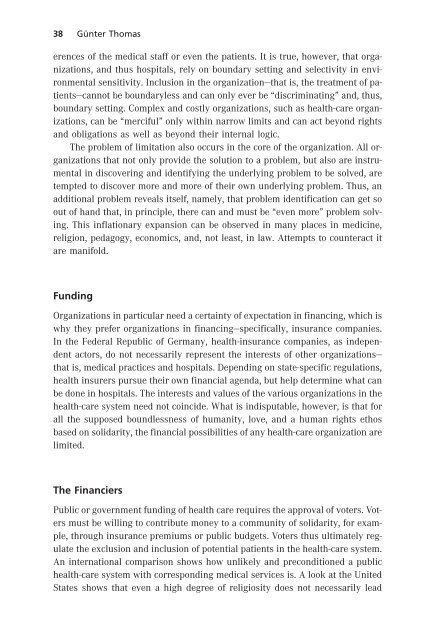Michael Welker | Eva Winkler | John Witte, Jr. | Stephen Pickard (Eds.): The Impact of Health Care (Leseprobe)
Pluralism has become the defining characteristic of many modern societies. Not only a plurality of individual and social claims and activities gain impacts on societal life. A creative pluralism of institutions and their norms profoundly shape our moral commitments and character – notably the family, the market, the media, and systems of law, religion, politics, research, education, health care, and defense. In the theoretical, empirical, and historical contributions to this volume, specialists on medicine, medical ethics, psychology, theology and health care discuss the many challenges that major transformations in their areas of expertise pose to the communication and orientation in late modern pluralistic societies. Contributors come from Germany, the USA and Australia.
Pluralism has become the defining characteristic of many modern societies. Not only a plurality of individual and social claims and activities gain impacts on societal life. A creative pluralism of institutions and their norms profoundly shape our moral commitments and character – notably the family, the market, the media, and systems of law, religion, politics, research, education, health care, and defense.
In the theoretical, empirical, and historical contributions to this volume, specialists on medicine, medical ethics, psychology, theology and health care discuss the many challenges that major transformations in their areas of expertise pose to the communication and orientation in late modern pluralistic societies. Contributors come from Germany, the USA and Australia.
Create successful ePaper yourself
Turn your PDF publications into a flip-book with our unique Google optimized e-Paper software.
38 Günter Thomas<br />
erences <strong>of</strong> the medical staff or even the patients. It is true, however, that organizations,<br />
and thus hospitals, rely on boundary setting and selectivity in environmental<br />
sensitivity. Inclusion in the organization—that is, the treatment <strong>of</strong> patients—cannot<br />
be boundaryless and can only ever be “discriminating” and, thus,<br />
boundary setting. Complex and costly organizations, such as health-care organizations,<br />
can be “merciful” only within narrow limits and can act beyond rights<br />
and obligations as well as beyond their internal logic.<br />
<strong>The</strong> problem <strong>of</strong> limitation also occurs in the core <strong>of</strong> the organization. All organizations<br />
that not only provide the solution to aproblem, but also are instrumental<br />
in discovering and identifying the underlying problem to be solved, are<br />
tempted todiscover more and more <strong>of</strong> their own underlying problem. Thus, an<br />
additional problem reveals itself, namely, that problem identification can get so<br />
out <strong>of</strong> hand that, in principle, there can and must be “even more” problem solving.<br />
This inflationary expansion can be observed in many places in medicine,<br />
religion, pedagogy, economics, and, not least, in law. Attempts tocounteract it<br />
are manifold.<br />
Funding<br />
Organizations in particularneed acertainty <strong>of</strong> expectation in financing, which is<br />
why they prefer organizations in financing—specifically, insurance companies.<br />
In the Federal Republic <strong>of</strong> Germany, health-insurance companies, as independent<br />
actors, do not necessarily represent the interests <strong>of</strong> other organizations—<br />
that is, medical practices and hospitals. Depending on state-specific regulations,<br />
health insurers pursue their own financial agenda, but help determine what can<br />
be done in hospitals. <strong>The</strong> interestsand values <strong>of</strong> the various organizations in the<br />
health-care system need not coincide. What is indisputable, however, is that for<br />
all the supposed boundlessness <strong>of</strong> humanity, love, and ahuman rights ethos<br />
based on solidarity, the financial possibilities <strong>of</strong> any health-care organization are<br />
limited.<br />
<strong>The</strong> Financiers<br />
Public or government funding <strong>of</strong> health care requires the approval <strong>of</strong> voters. Voters<br />
must be willing to contribute money to acommunity <strong>of</strong> solidarity, for example,<br />
through insurance premiums or public budgets. Voters thus ultimately regulate<br />
the exclusion and inclusion <strong>of</strong> potential patients in the health-care system.<br />
An international comparison shows how unlikely and preconditioned apublic<br />
health-care system with corresponding medical services is. Alook at the United<br />
States shows that even ahigh degree <strong>of</strong> religiosity does not necessarily lead
















